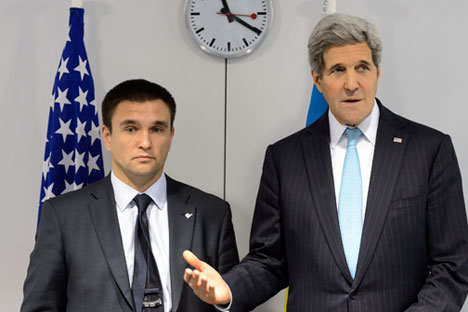
U.S. Secretary of State John Kerry talks to Ukraine's Foreign Minister Pavlo Klimkin at the meeting of foreign ministers from the OSCE in Basel, December 4, 2014. Source: Reuters
The Kommersant business daily writes that the European Union is intensifying contacts with the newly elected Ukrainian government. The newspaper reports on a recent meeting in Brussels between Ukrainian Foreign Minister Pavlo Klimkin and the Group of Friends of Ukraine, which includes European Parliament representatives of several ex-Soviet states, as well as Belgium, Denmark, Finland, Ireland and Malta.
The main topics of the meeting were the conflict in the Donbass region of eastern Ukraine and ways to address it, as well as Ukraine’s economic situation. Lithuanian Foreign Minister Linas Linkevičius made it clear that even the countries with the most loyalty to Kiev want to see the fruits of the reform activity carried out by Ukrainian Prime Minister Arseniy Yatsenyuk’s cabinet in the next six months.
The Ukraine-EU Association Council has also held its first meeting in Brussels, with head of European diplomacy Federica Mogherini deeming the council a “new page in relations” between Kiev and Brussels.
Experts questioned by Kommersant said that the dramatic rise in EU activity in Ukraine has to do with serious concerns on Brussels’ part. “An escalation of the conflict in the Donbass would be capable of causing a humanitarian catastrophe in Eastern Europe,” said Arkady Moshes, director of the Russian program at the Finnish Institute of International Affairs. According to him, such a turn of events would force Brussels to consider new sanctions against Russia, which the EU would like to avoid. “In light of all this, the EU is attempting to be proactive,” he told Kommersant.
The tabloid newspaper Moskovsky Komsomolets writes that the EU foreign ministers have agreed on another package of sanctions against Crimea. According to head of European diplomacy Federica Mogherini, the sanctions were approved after the Ukraine-EU Association Council’s first meeting on Dec. 15.
The newspaper reports that the sanctions ban European entrepreneurs from investing in the Crimean economy and participating in its tourism business. “The implementation of these restrictions requires further technical work. However, we are committed to our goal of implementing them by the European Council meeting on December 18-19,” Moskovsky Komsomolets quotes Mogherini as saying.
The EU has already imposed several sanctions directly against Crimea. It has banned imports of goods from the peninsula without the agreement of the Ukrainian authorities, as well as investments in transport, energy, and telecoms infrastructure.
Explaining the need for new sanctions, Mogherini said the EU will never recognize the annexation of Crimea.
Russian Foreign Minister Sergei Lavrov and his U.S. counterpart John Kerry are trying to prevent a split in the global community, the centrist newspaper Nezavisimaya Gazeta reports. The situation in the Middle East is in need of urgent attention, which has prompted an emergency meeting between the Russian and American foreign ministers in Rome.
Diplomatic activity is on the rise amid attempts by the Palestinian authorities to pass a resolution at the United Nations that would terminate the Israeli occupation of the West Bank within two years and declare an independent Palestinian state with its capital in East Jerusalem, Nezavisimaya Gazeta reports.
Because the resolution was drafted with Jordan’s help and supported by the Arab League, the United States is attempting to avoid a direct confrontation in the Security Council. Washington fears a confrontation could harm the creation of a coalition to fight the ISIS radical jihadist movement.
As an alternative, the Americans are weighing the possibility of supporting a draft resolution proposed by France. That resolution would also call on Israel to withdraw from Jordan’s West Bank over the next two years, although that can only be accomplished if an agreement is reached between the parties.
Nezavisimaya Gazeta reports that another possible step would be for Washington to write its own draft resolution that would also mention a Palestinian state with its capital in Jerusalem. However, the document would also contain Israel’s demand to be recognized as a Jewish state.
Russian Deputy Foreign Minister Mikhail Bogdanov, Russia’s special presidential envoy for the Middle East, has already said Moscow will support any resolution to create a Palestinian state if it is submitted for review by the Security Council.
All rights reserved by Rossiyskaya Gazeta.
Subscribe
to our newsletter!
Get the week's best stories straight to your inbox